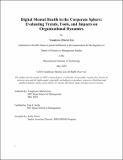Digital Mental Health in the Corporate Sphere: Evaluating Trends, Tools, and Impacts on Organizational Dynamics
Author(s)
Zou, Yangluyao (Maria)
DownloadThesis PDF (1.355Mb)
Advisor
Kelly, Erin L.
Terms of use
Metadata
Show full item recordAbstract
The escalating prevalence of mental health issues in the corporate world, exacerbated by the COVID-19 pandemic, has necessitated a reevaluation of traditional wellness programs. This thesis critically examines the integration, effectiveness, and organizational impact of digital mental health tools within corporate environments, with a particular focus on improving employee wellbeing and optimizing organizational dynamics. Grounded in a mixed-methods approach, this research encompasses an extensive literature review and 31 semi-structured interviews with a diverse cohort of stakeholders, including human resources managers, corporate executives, mental health professionals, and employees across various sectors. This methodology facilitated a deep exploration of the perceptions, challenges, and outcomes associated with the adoption of digital tools such as ecological momentary assessments, wearable biosensors, and virtual reality for emotional regulation. Key findings reveal that digital interventions, when appropriately integrated, offer substantial benefits over traditional wellness programs by providing timely, personalized, and data-driven mental health support. These technologies enable continuous monitoring and management of employee stress levels and foster a proactive approach to mental health care. Notably, the success of these digital tools is intrinsically linked to organizational changes, such as work redesign strategies that include flexible working conditions, role restructuring, and enhanced workplace social support systems. Moreover, the research highlights several barriers to the effective implementation of digital mental health tools, including cultural resistance to mental health discussions in the workplace, privacy concerns, and the need for significant shifts in organizational policies and practices. Facilitators for successful integration include leadership endorsement, the normalization of mental health conversations, and the strategic alignment of digital tools with organizational health goals. The thesis proposes a comprehensive framework for the effective integration of digital mental health tools within the corporate sector. This framework suggests that true effectiveness is achieved not only through the deployment of advanced technologies but also through fundamental enhancements to the organizational environment that foster an inclusive, supportive, and flexible workplace. This study contributes to academic and practical understandings of how digital innovations can transform corporate mental health strategies. It underscores the need for a synergistic approach that merges technology with significant organizational reforms, advocating for a holistic model that not only addresses immediate mental health needs but also fosters long-term employee wellbeing and productivity.
Date issued
2024-05Department
Sloan School of ManagementPublisher
Massachusetts Institute of Technology